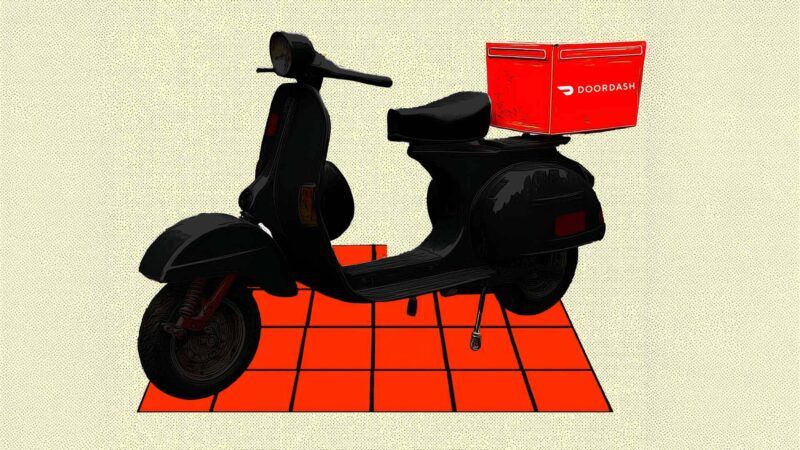In Boston's Scooter 'Wild West,' Lawmakers Take Aim at the Wrong Target
The city passed a law cracking down on food delivery companies rather than the reckless drivers creating chaos on sidewalks and streets.

After heated debates on the topic for almost a year, Boston's city council recently passed an ordinance addressing what it deems "dangerous conditions" caused by scooters and e-bikes operated by food delivery drivers. Instead of holding those responsible for the unsafe street conditions—the drivers themselves—the council instead decided to target delivery platforms.
In June 2024, the Boston police department and Mayor's office warned delivery companies of an impending crackdown based on what they described as "widespread and ongoing incidents of running red lights, driving on city sidewalks, driving the wrong way down one-way streets, driving at speeds in excess of posted limited, and collisions." The mayor's office cited over 100 complaints filed in the last year regarding reckless moped drivers, many of which allegedly involved unregistered scooters operating illegally within the city. The new ordinance requires delivery companies to provide liability insurance for all their drivers and to share internal data on deliveries made in the city.
"Boston can no longer be the Wild West," said Councilor Ed Flynn, who represents the city's second district. "Whether it's cars, mopeds, dirt bikes, electric bikes, or bikes, everyone has to be obeying the same rules of the road."
While no one wants an influx of scooter-related injuries—and few, if any, would endorse things like driving on sidewalks in heavily foot-trafficked areas—Boston's ordinance is curious in its selective application. It specifically applies to prominent gig companies that specialize in food delivery from restaurants, but does not apply to companies that focus on grocery delivery.
The presumed logic is that a DoorDash scooter driver picking up a Chipotle burrito is more likely to access sidewalks with lots of pedestrians than an Instacart driver in a large, open grocery parking lot. This overlooks the reality that most urban grocery stores lack traditional suburbia-style lots, or that a grocery shopper is just as likely to deliver to a high-rise apartment in a busy area as a driver carrying a Five Guys order.
Further adding to the arbitrary nature of the new ordinance, it only applies to delivery companies that fulfill at least one million orders per year. But when it comes to road safety, a scooter or e-bike driver's recklessness would rarely seem correlated to who provides his or her paycheck, any more than one could assume that a Domino's pizza delivery driver is automatically more dangerous than a driver from a local pizzeria. If anything, drivers for larger gig companies may be safer given that these companies usually require their drivers to be at least 18 years old even for scooter and bike delivery, whereas local joints might employ 16- or 17-year-old high schoolers for cheaper labor (16 is the minimum age to operate an e-bike in Massachusetts).
One reason for the clunky and selective application of the new ordinance is that it is drivers, not e-platforms, who are behind the wheels of a scooter or e-bike.
"Boston already has comprehensive traffic laws designed to address safety concerns associated with food delivery drivers," said Councilor Erin Murphy, one of only two councilmembers to vote against the ordinance. "Effective enforcement of these existing regulations should be our primary strategy, rather than introducing additional legislation that may be redundant and burdensome." (Ironically, Boston officials have even pushed the use of e-bikes for certain types of deliveries in recent years in an effort to reduce greenhouse gas emissions.)
The proliferation of e-bikes and scooters in heavily urban areas raises important policy issues that deserve thoughtful deliberation. As senior fellow at the Manhattan Institute Nicole Gelinas has pointed out, much of the "conflict" between scooters and pedestrians has been "created by transportation planners who pit walkers, cyclists and now scooterists against each other by continuing to devote far more street space to the car."
But instead of looking at themselves—or the drivers actually responsible for Beantown's concerns—Boston's progressive planners apparently find it much easier to keep targeting the gig economy boogeyman.


Show Comments (55)